Bible
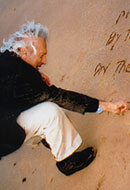 The Jewish Samuel Menashe
The Jewish Samuel MenasheMonday, August 29, 2011 by David Curzon | Jewish Ideas Daily » Daily Features
The poet Samuel Menashe, who died on August 22 at the age of eighty-five, grew up in Queens, New York. His poems have always been appreciated by other poets; but, until late in his life, his poetry did not receive the attention it deserved.
 The Challenge of Eilat
The Challenge of EilatFriday, August 12, 2011 by Elliot Jager | Jewish Ideas Daily » Daily Features
In a country where the sky is mostly blue, the southernmost city of Eilat has nonetheless laid claim—with justification—to being Israel's sun capital. Reliably good weather does not, however, solve all problems.
 The New Enemies of Circumcision
The New Enemies of CircumcisionThursday, August 11, 2011 by Jon D. Levenson | Jewish Ideas Daily » Daily Features
Among the practices that have characterized the Jewish people over the millennia, surely none has been observed more widely, or more faithfully, than circumcision.
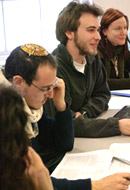 Reconstructing Judaism
Reconstructing JudaismWednesday, August 3, 2011 by Joseph J. Siev | Jewish Ideas Daily » Daily Features
At a time when all three major Jewish denominations in America—Orthodox, Conservative, and Reform—find themselves in a state of deep internal fracture, a fourth and much smaller movement, Reconstructionism, has just voted to create a unified body to coordinate the activities of its lay and rabbinical arms.
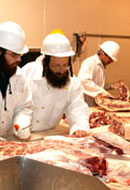 Slaughterhouse Rules
Slaughterhouse RulesFriday, July 29, 2011 by Elli Fischer | Jewish Ideas Daily » Daily Features
Pending approval by its upper house of parliament, the Netherlands will join Switzerland and a handful of other Western countries in mandating that animals slaughtered for food must first be stunned unconscious, generally by a hammer blow to the skull.
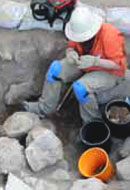 The New Biblical Archeology
The New Biblical ArcheologyMonday, July 25, 2011 by Alex Joffe | Jewish Ideas Daily » Daily Features
Every summer, the Israel Antiquities Authority holds a reception for foreign archeological teams excavating in Israel. This year's reception was attended by over 200 archeologists, who are investigating sites ranging in age from the Paleolithic through Islamic periods.
 The Loyalties of the Sephardim
The Loyalties of the SephardimFriday, July 22, 2011 by Aryeh Tepper | Jewish Ideas Daily » Daily Features
In a recent Haaretz column, Gideon Levy, the radical leftist polemicist, sounded the warning that Israel's religious Zionists—"the knitted skullcaps"—have joined hands with the ultra-Orthodox and the Sephardim to form "a united tribe of zealots."
 The Bible and the Good Life
The Bible and the Good LifeThursday, July 14, 2011 by Aryeh Tepper | Jewish Ideas Daily » Daily Features
What manner of work is the Hebrew Bible? The 17th-century freethinker Baruch (Benedict) Spinoza had an answer. As part of his war to emancipate philosophy from the influence of religion, he reduced the biblical message to, in effect, one word: obedience.
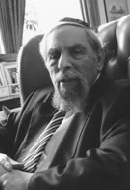 The Reluctant Renegade
The Reluctant RenegadeTuesday, July 12, 2011 by Elliot Jager | Jewish Ideas Daily » Daily Features
Since its founding, Conservative Judaism in the U.S. has defined itself in sharp contrast to Reform, pursuing a more religiously centrist and Zionist middle course. Its UK parallel, Masorti ("traditional") Judaism, was born as a secession movement from Orthodoxy—inspired by theologian Louis Jacobs.
 What is Aggadah, and How to Read It
What is Aggadah, and How to Read ItThursday, July 7, 2011 by Elli Fischer | Jewish Ideas Daily » Daily Features
Although the Talmud is best known for its discourse on religious law, its pages contain a vast amount of non-legal material, including ethical teachings, interpretations of biblical narratives (midrash), and excurses on topics from brain surgery to dream interpretation.
Editors' Picks
Narrating the Law Dvora E. Weisberg, H-Net. A new work of Talmud scholarship challenges the traditional distinction between halakhah and aggadah by identifying an overlapping literary genre: the talmudic legal story.
The Judeo-Christian Ethic and the Spirit of Capitalism Jonathan Sacks, Washington Post. In this perilous economic climate, we should remember the lesson of the world's first economist, the biblical Joseph: Years of plenty tend to be followed by years of hardship.
Israeli Inflation Ronen Bergman, New York Times. The rising cost of the life of an Israeli hostage, from the Entebbe raid to the Shalit deal.
Tangled Up in What? Joel Davidi, Toledot Am Ha-Sefer. Josephus refers to "a remembrance upon the arms" (which may or may not be figurative); Aristeas refers to a "sign around the hand" (same). Why are the earliest Jewish sources on tefillin so ambiguous?
The King versus Bloom Hillel Halkin, Jewish Review of Books. By temperament a strong misreader, the Hebrew Bible is a mine of riches for Harold Bloom. The King James version of it, considered solely as the fine and faithful translation that it is, is less so.
The Lord is My . . . Lumberjack? Michael Carasik, Shofar. The topic of biblical translation deserves a good book for a general readership. But one recent effort is problematic at best—and preposterous at worst.
Putting the Pieces Together Ofer Aderet, Haaretz. An ambitious new project aims to digitize the entire Cairo Genizah, thus virtually reassembling half a million document fragments scattered around the world.
Why Joshua? Meir Soloveichik, Jewish Ideas Daily. What is truly celebrated on Simhat Torah: the fact that the Torah has been completed, or that its reading begins again? The choice of the day's Haftarah, and the history of that choice, offer a clue. (PDF, 2010)
Her Price is Far Above . . . . Philologos, Forward. The King James Version puts the price of a virtuous woman above "rubies"; others say "pearls" or "corals." Who is right?
Reviving the Dead Sea Scrolls Jon Stokes, Cloudline. Google's digitization of the Dead Sea Scrolls will enable easy public viewing and radically advance the tools, and the cause, of historical scholarship.

